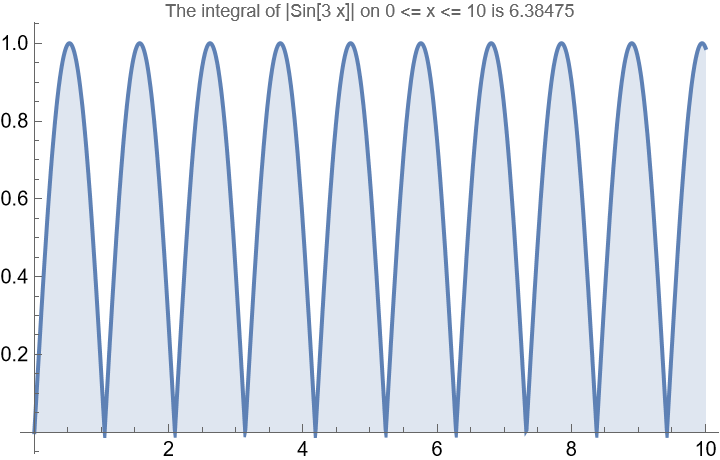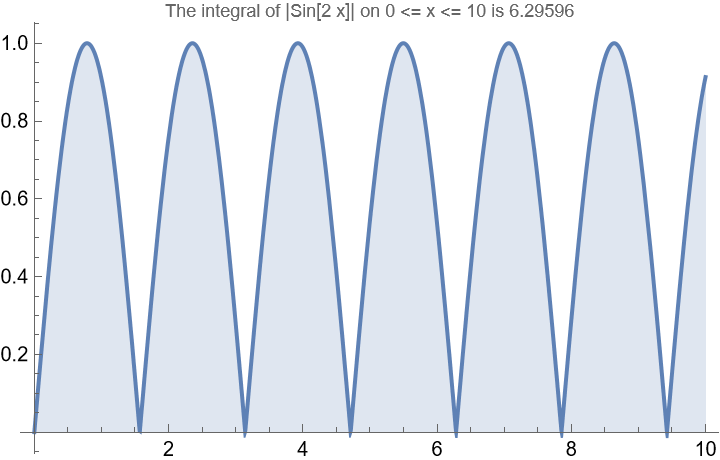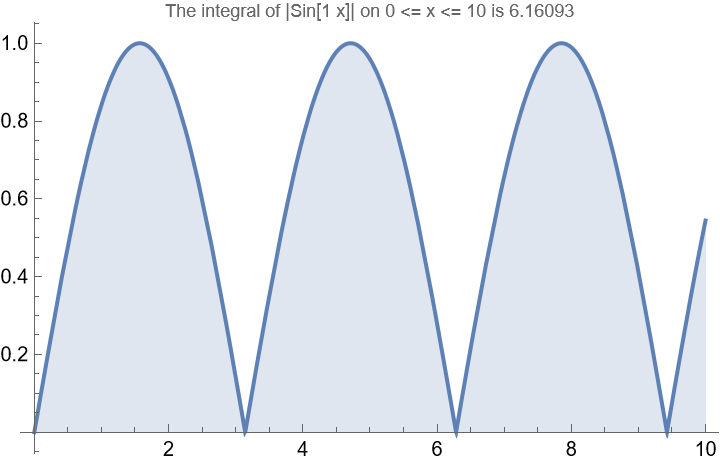Wolfram Function Repository
Instant-use add-on functions for the Wolfram Language
Function Repository Resource:
Define a data structure that can refer to its own values to compute new ones
ResourceFunction["AssociationTemplate"][assoc] creates an Association-like object in which RuleDelayed (⧴) values can be combined with TemplateSlots and Functions to create values that depend on other keys. |
Define an AssociationTemplate in which the first key acts as a parameter for a computation:
| In[1]:= | ![tAssoc = ResourceFunction["AssociationTemplate"][
<|
"a" -> 3,
"int" :> Function[NIntegrate[Abs@Sin[#a x], {x, 0, 10}]],
"title" :> "The integral of |Sin[`a` x]| on 0 <= x <= 10 is `int`",
"plot" :> Plot[Abs@Sin[TemplateSlot["a"] x], {x, 0, 10}, PlotLabel -> Style[TemplateSlot["title"], Small], Filling -> Axis]
|>
]](https://www.wolframcloud.com/obj/resourcesystem/images/f2f/f2f500e3-546c-4dbf-ac3e-9891111de9a4/34fe3312b69e34dd.png) |
| Out[1]= |  |
Query a value:
| In[2]:= |
| Out[2]= |  |
Use a two-argument query to temporarily override keys with new (non-templated) values. The second argument has to be an Association:
| In[3]:= |
| Out[3]= |  |
Query all keys and return the result as an Association:
| In[4]:= |
| Out[4]= |  |
Use Append or Prepend to create a new AssociationTemplate with a different key value:
| In[5]:= |
| Out[5]= |  |
| In[6]:= |
| Out[6]= |  |
AssociationTemplate can be used with the functions Length, Keys, Values and Normal:
| In[7]:= | ![tAssoc = ResourceFunction["AssociationTemplate"][
<|
"a" -> 3,
"int" :> Function[NIntegrate[Abs@Sin[#a x], {x, 0, 10}] ],
"title" :> "The integral of |Sin[`a` x]| on 0 <= x <= 10 is `int`",
"plot" :> Plot[Abs@Sin[TemplateSlot["a"] x], {x, 0, 10}, PlotLabel -> Style[TemplateSlot["title"], Small], Filling -> Axis]
|>
];](https://www.wolframcloud.com/obj/resourcesystem/images/f2f/f2f500e3-546c-4dbf-ac3e-9891111de9a4/71d8dc5c323e2319.png) |
| In[8]:= |
| Out[8]= |
| In[9]:= |
| Out[9]= |
| In[10]:= |
| Out[10]= |  |
Normal will turn all templated values into a TemplateExpression or TemplateObject or leave them as a Function:
| In[11]:= |
| Out[11]= |  |
Join two templates together:
| In[12]:= |
| Out[12]= |  |
| In[13]:= |
| Out[13]= |
It is possible that some keys can return different values with each query:
| In[14]:= | ![tAssoc = ResourceFunction["AssociationTemplate"][
<|
"a" :> RandomInteger[{1, 10}],
"b" :> 2*TemplateSlot["a"] + Pi*RandomInteger[{1, 10}] ,
"c" :> {TemplateSlot["a"], TemplateSlot["b"]}
|>
];](https://www.wolframcloud.com/obj/resourcesystem/images/f2f/f2f500e3-546c-4dbf-ac3e-9891111de9a4/24edf240324632e1.png) |
| In[15]:= |
| Out[15]= |
Within a single query, the values will be consistent and each key will be evaluated no more than once:
| In[16]:= |
| Out[16]= |
| In[17]:= |
| Out[17]= |
| In[18]:= |
| Out[18]= |
AssociationTemplate will return a Failure object if cyclical dependencies are detected:
| In[19]:= |
| Out[19]= |
| In[20]:= |
| Out[20]= |
| In[21]:= | ![ResourceFunction["AssociationTemplate"][
<|
"a" :> TemplateSlot["b"],
"b" :> TemplateSlot["a"] |>
]](https://www.wolframcloud.com/obj/resourcesystem/images/f2f/f2f500e3-546c-4dbf-ac3e-9891111de9a4/202af9e40d95bd45.png) |
| Out[21]= |
This work is licensed under a Creative Commons Attribution 4.0 International License